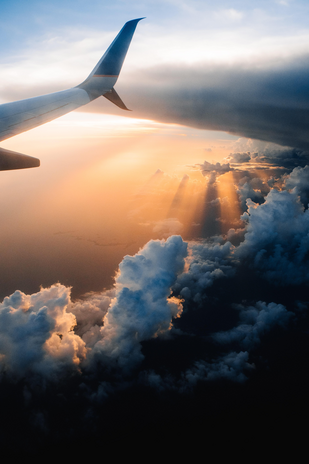Over the 2016-17 semester break, I had the privilege of going to Fontaine, Haiti on a service-immersion trip. It was a semi-impulsive decision that I made, but definitely one that I have no regrets about. What could be better than charging $1,500 to your student account for the betterment of yourself and society?
Saint Gabriel’s School, Fontaine, Haiti
1. You break out of your comfort zone.
From driving along a dirt road for four hours to having to shower under a freezing drip, you’ll be faced with a multitude of experiences that force you to come to terms with the fact that you’re not in the cushy United States anymore. Fear not, though: you get used to the physical unfamiliarities fairly quickly, and you learn to embrace and enjoy any potentially strange encounters you may have. Service trips are all about expanding your boundaries, so there will definitely be times when you’ll have to stress a little to make the most of your experience.
2. You’ll form some unexpected (and amazing) relationships.
Service trips are basically a guaranteed way to make a ton of new friends. Between your travel group and the locals, you’ll end up sharing moments with people from all walks of life, some of whom you never thought you’d encounter. Particularly with the other students and friars, you laugh endlessly, cry minimally, and end up having more inside jokes than you’ll be able to remember. As a person who has a rather dry sense of humor, I can say that I’ve never smiled and laughed as much as I did during the week I was in Haiti.
3. You have the opportunity to experience a new culture that you might not necessarily otherwise get to.
Particularly in countries of another “world”, the culture is so astoundingly different from that of American culture. Thus, service immersion trips are a terrific way to experience the people, food, music, language, and lifestyle while also doing something humanitarian.
4. You’re forced to think differently and more critically.
I remember a specific moment in Haiti when I was having a difficult time grappling with what was going on: we were on what was supposed to be a four-hour car ride from the airport to the north side of the country. It was an uncomfortable drive, with 15 of us crammed into a non-air conditioned van. I wanted to sleep, but I was having a great deal of difficulty doing so. After about three hours of unsuccessfully “resting”, I opened my eyes and tried to understand what I was seeing and feeling: endless desert terrain around me, the nauseating bumps of the ride, and totally unfamiliar surrounding sights. I plugged my earphones in, trying to find a song to listen to. After deciding that I couldn’t find a song to fit my mood, I scrolled through my pictures, trying to find something to look at and reminisce over. I decided that wasn’t appropriate either, so it was then that I chose to leave my “American” life and behaviors behind and begin my trip with fresh eyes.
5. You get to purge on a lot of your stuff.
As an aspiring minimalist/environmentalist, this had to be one of my favorite aspects of the trip. It felt so incredibly satisfying to be able to go through all of my belongings at home and pull out the ones I knew I wasn’t going to use anymore, knowing that they would better serve someone who had nothing. I collected donations from friends, neighbors, and coworkers, and was able to supply the kids and citizens of Haiti with food, clothes, toiletries, school supplies, and toys—all while lightening my own material load. The gratification of leaving the U.S. with a 50-pound suitcase and returning with a mere seven pounds was something I’ll never forget.
6. You’ll realize how much you actually have and how lucky we are.
This one is a bit more obvious, but definitely deserves all the acclaim it gets. Going from having tons of amenities to none sounds like a harsh transition, but in my experience, it really wasn’t. The only major adjustment is getting accustomed to the caution that has to be taken when drinking or using the water in Haiti. You’ll also note that the Haitian life has really no frills. They have only what they need, and nothing more—and they’re not complaining about it.
7. You’ll realize that the first world life isn’t necessarily better.
One thing that really struck me as fascinating was that with every child, teenager, elder, or working person I encountered, nobody was unhappy. Not a single soul was sorrowful. Everyone was smiling, laughing, joking, playing, singing, or dancing. The Haitians know that they’re poverty-stricken. They’re aware of their circumstances. But they don’t sit around feeling sorry for themselves. They get up and make the best of every opportunity that comes their way. They’re some of the most beautiful souls I’ve had the chance to encounter, and I was so touched to learn of their joyful lives. One could only hope that everybody has the chance to live this happily, but alas, the rat race of first world life makes this near impossible. The paradox lies in the fact that we think that we’re the best off because we have the most—while we may be materialistically rich, our souls pale in comparison to those who have nothing and still walk around radiating happiness.
8. No technology has never felt so refreshing.
For most of us, the prospect of being in a remote place with no phone or Wi-Fi is terrifying enough to keep us from going to said place. I can attest to the fact that I was definitely worried that I wouldn’t be able to check Snapchat every .2 seconds, or that my crush would post on Instagram and I wouldn’t be able to like it. Well, guess what? None of that matters! At all! As soon as I stepped off the plane, I divorced myself emotionally from my phone. It wasn’t daunting at all because I was with people I kind of knew and would be spending all of my time with, so I could actually socialize in real life instead of through a screen. The social aspect aside, though, it was so refreshing to not feel pressured to keep up with the goings-on of the world. I decided that whatever happened in the U.S., I didn’t want to hear about it until I was back in North America. The technological vacation may have been one of the best elements of the trip.
9. You actually start to understand the third world and poverty a little bit better.
Pay no mind to the UNICEF commercials that portray the kids in third-world countries as sad and dying. No, these kids do not live in ideal circumstances. They don’t know how to care for themselves, they wear the same clothes day in and day out, and they don’t necessarily know where their next meal is coming from. However, as I mentioned before, they don’t let it show. They can’t contain their enthusiasm and love, which they greeted us with as soon as we pulled up to the school where we would be staying. You take in the world around you—the lack of infrastructure, the pollution and simplistic living. But nobody will come up to you and cry to you about their lives, which are—from my observations—richer than we could ever hope for ours to be.
10. You’ll realize how crazy the language barrier actually is, but how easy it is to break.
Yes, of course it’s scary to venture into a country where you hardly know the language. With my high-school French, I wasn’t too worried—how different can Creole possibly be, right? Wrong—I got some weird looks when I thought I was making perfect sense, but I suppose that’s all part of the learning process. Regardless, I found it much easier to demolish the language barrier without using language at all. It’s all about touch—I fostered some remarkable connections with kids just by letting them sit on my shoulders, or sip from my water bottle. It was definitely the smaller moments like those that had the biggest impact on me.
11. You’ll be faced with some hard decisions.
Haiti didn’t provide me with many hardships at all. The most difficult thing I would say I had to do, besides take a freezing shower, was tell a child, “No, I can’t give you food,” or to tell a vendor, “No, I can’t give you $20 for that necklace.” Inherently, all of us who went on the trip are good people, and would have liked to give these kids the world if we could have. In reality, though, if we gave one kid a cookie, we would have had to give fifty more kids cookies, and we didn’t have the means to do that. It was terrible to have to lie to them, because they know we come bearing gifts, but we had to keep the interest of the greater good in mind.
12. You’ll make unforgettable memories.
I feel like this goes without saying, as any trip comes with a plethora of memories to be cherished, but this one provided me with some experiences that were truly unique. I never thought I’d be partying with a friar, riding in the back of a pickup truck while saying hi to everyone I passed by, or eating raw sugarcane, but I was fortunate enough to have been able to do all of those things. For most of us, the most unforgettable part was absolutely the children—they were so precious and trusting, never resisting an opportunity to hug us, hold our hands, or steal our phones to take selfies. Every single one of us wishes that we could adopt these kids, but alas, we just have to cherish our time spent together and wish them well.
13. You won’t want to come back to the U.S.
Between the food, the company, and the climate, you’ll never want to return to your fast-paced life. Who could bear to leave the adorable little kids, the sassy and sweet teenagers, the endless amount of places to go, the breathtaking views, and the unbelievable food? Oh, and the sunshine didn’t hurt, either. Even when it rained, none of us were stuck inside—there was always something to do, somewhere to go, someone to see. The best part about it all is that everything feels leisurely. Even when we were teaching (which is what we were there to do), it felt like an activity rather than a job—which it should. Life down there was so relaxing and made me want to stay forever.
If you think you’re interested in embarking on a service-immersion trip, feel free to visit the Franciscan Center for Service and Advocacy, located in Hines Hall 230-233!
https://www.siena.edu/centers-institutes/franciscan-center-for-service-and-advocacy

